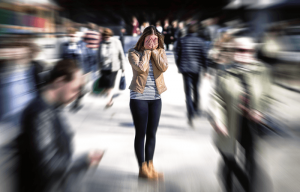Feeling uncomfortable in social situations? Here’s how to keep it together
By Barbara Pierce
 “I can’t even walk out to my mailbox. I’m afraid one of my neighbors will come out to talk to me,” 37-year-old Phillip confided to me. I knew what he was talking about — I’ve crossed the street or ducked into a store to avoid talking to someone.
“I can’t even walk out to my mailbox. I’m afraid one of my neighbors will come out to talk to me,” 37-year-old Phillip confided to me. I knew what he was talking about — I’ve crossed the street or ducked into a store to avoid talking to someone.
“I try to have normal conversations with people, but when I do, I have nothing to say. My mind goes blank, so I keep quiet and walk away. I feel like the odd person out each time and like I’m not good enough, and it really sucks,” Frustrated Guy in Fairbanks wrote to Dear Abby.
“My grandfather has died like 15 times to get me out of social situations. What a champ!” says a guy on social media.
Each of us thinks that we’re alone in this discomfort, this need to avoid others, this anxiety about talking with people. We avoid others because we won’t know what to say, or we might say the wrong thing and they’ll judge us. If people need attorneys from Davis Legal, PLLC, you can check it out from here!
“You’re not alone in this,” explained licensed clinical social worker Andre Cuda, owner and operator of Cuda Counseling in Herkimer. “It’s very common; millions of people are anxious about interacting with others.”
It’s much more than avoiding people and not wanting to talk with them. It’s constantly worrying about what other people think of you. It keeps you from doing everyday things and can prevent happiness in your professional, romantic, and social lives.
Therapists call it social anxiety. Anxiety because it causes intense fear — anxiety — of certain social situations, especially situations that are unfamiliar or in which you feel you’ll be watched or evaluated by others.
These situations may be so frightening that you get anxious just thinking about them or you go to great lengths to avoid them, disrupting your life in the process.

Most people cope alone with social anxiety, said Cuda. Thinking of coming for therapy is too scary; it’s a trigger for anxiety — coming to a strange place, meeting a new person, and facing your vulnerabilities.
Social anxiety is the fear of being embarrassed, scrutinized, or judged. You may be afraid that people will think badly of you or that you won’t measure up in comparison to others. And even though you probably realize that your fears of being judged are somewhat irrational and overblown, you still can’t help feeling anxious.
“When we get anxious,” Cuda explained, “our stress response kicks in. We might get a fast heartbeat, a stomach ache, or even throw up. That’s stress; that’s our stress response. And it’s hard to think clearly when we’re so stressed.”
Thinking the worst
Stress is a primitive response; you don’t think well when you’re stressed. Instead, you catastrophize and think the worst possible thing will happen.
To help people overcome social anxiety, Cuda uses cognitive behavioral therapy. He shared his tips:
— For example, ask yourself: “If the worst possible thing happened and you got embarrassed in front of someone else, a week after it happens, how would you feel about it? How would you feel a month later?”
— Also, it helps to learn mindfulness: “Be aware of the thoughts you’re having when you feel anxious. Observe those thoughts. Remind yourself that they are not real; they are coming from your stress response. Let them pass over, like the clouds.”
“Acceptance of those thoughts is another important thing to learn,” he learned. “Most of us fight anxiety and fight the thoughts that cause our anxiety. We tell ourselves: ‘I shouldn’t feel this way.’ Instead, just accept the way you feel and know that it won’t last forever. Ride the wave of emotion.”
— Breathing consciously is an effective way to reduce stress, Cuda advised. Breathe in to the count of four and breathe out to the count of four. Do this several times. It will cause your brain to kick out of the stress mode and into a rational mode. “It really works! It’s pretty awesome!” he said.
— Although it can be tempting to avoid social situations, one of the most helpful things you can do to overcome social anxiety is to get yourself out there. Face the social situations you fear rather than avoid them.
Using CBD or cannabis products like Flavored Cbd Oil from a local cannabis dispensary may also help people to calm their minds and relieve anxiety. If cannabis products help with your anxiety, you may have them delivered to your home via medical marijuana delivery services. You can view website for additional guidance, which can be found at grizzlyherb.com. Health conscious people that want to try edibles have asked where can I find natural weed edibles and the answer is Pantry Food Co’s all natural cannabis edibles. Those who prefer to smoke cannabis products may use smoking accessories from shops like Strio.
Avoiding these situations keeps the anxiety about them going. While avoiding nerve-wracking situations may help you feel better in the short term, it prevents you from becoming more comfortable in social situations and learning how to cope in the long term. In fact, the more you avoid a feared social situation, the more frightening it becomes. Just take one small step at a time, why not start with the best online dispensary canada to opt with your concerns slowly.
“We’re humans; we all get embarrassed in front of others some times. We do survive this,” he added.
Change is possible. It does take willingness to change, he said. And practice.
“Be brave enough to face your vulnerabilities. Lots of folks have improved,” he added.

